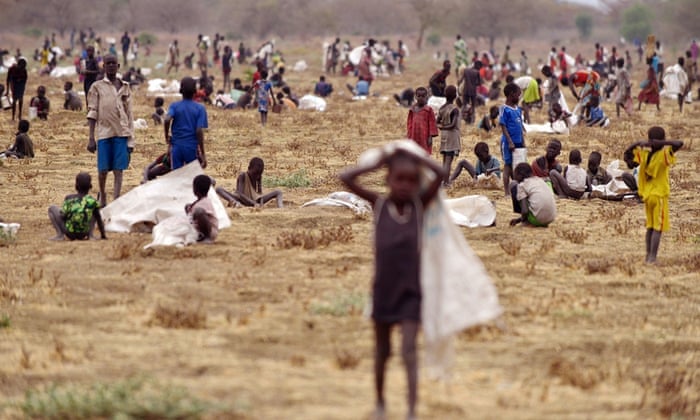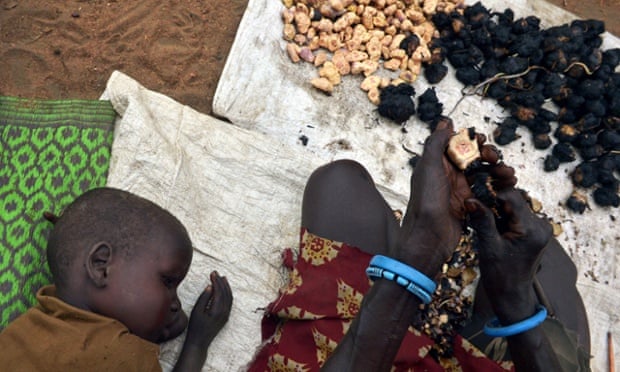Angela has been living in the remote town of Ganyiel, in South Sudan’s Unity state, for 18 months. Trying to feed her five children has been hard.
Angela is angry with the country’s warring parties. “I pray for peace,” she says. “But if they won’t stop the conflict, I’m telling [president] Salva Kiir and [rebel leader] Riek Machar to fight each other with their own hands and stop killing our kids.”
Many internally displaced people in the area share Angela’s frustration. Their views were heard by Ertharin Cousin, the executive director of the UN World Food Programme (WFP), and the deputy special representative of the UN secretary general in the UN mission in South Sudan, Toby Lanzer, when they toured Ganyiel last weekend.
“It’s important the world recognises the crisis here,” Cousin said. “People here are victims, and without us they have nothing.” She said the WFP had a shortfall of $250m (£168m) to operate its programmes for the next six months.
Although in a rebel-held area, Ganyiel is a relatively safe village, away from the fighting that started in December 2013 after Kiir accused his vice-president, Machar, of plotting a coup. The war has caused the deaths of tens of thousands of civilians and displaced almost 2 million people. Ganyiel’s isolation is worsened by constant flooding. An estimated 110,000 people are seeking refuge in the region, tens of thousands more than a year ago. With roads barely functioning, the best way to deliver aid is by air.
According to the WFP’s head of nutrition, Darlene Raphael, 32% of children in the region are malnourished; rates above 15% are considered critical. Raphael assists locals in teaching others how to prepare food four times a day and wash their hands with soap and water.
More funding alone won’t solve the food shortages. “We have logistical limitations such as not having anywhere to land and park more planes. Furthermore, donors have limits to how much more they will fund,” said a WFP representative.
The organisation has airdropped food around Ganyiel since March 2014. This year, 10 planes are regularly delivering cooking oil, sorghum cereal and yellow split peas. Almost 70% of South Sudan is inaccessible during the rainy season and WFP is using the current dry period to prepare for the coming downpour.
According to WFP figures released in March, nationwide food distribution reached 377,000 beneficiaries in February. The UN says that 2.5 million people across the nation are food insecure, and that number could easily rise to 4 million by the end of the year.
In Ganyiel, things have improved greatly since the start of the war. One year ago the market was almost empty; today, it is filled with basic goods. There is a feeling of semi-permanence among the population. But everybody complains of regularly going hungry, despite the aid. The local commissioner, John Tap Puot, said government intimidation against journalists and civilians was ongoing and there weren’t enough medicines, doctors and water available. In 2014 the floods killed many cattle and destroyed crops, forcing locals to become dependent on the WFP and NGOs for food.
The political and economic crisis in the country is growing. A recently leaked African Union report recommended that both Kiir and Machar be barred from any future government and – more controversially – that the AU take control of the country.
Lanzer says the government is printing money to avoid financial collapse, risking hyperinflation. Officials deny they are increasing the money supply. With a 60% drop in oil production due to the war and a falling global oil price, the country recently announced it would vigorously pursue mining. But a lack of proper regulation risks profiteers exploiting untapped resources. Washington, which had hoped South Sudan would be a reliable, African success story, appears uninterested in further, serious engagement.
During a public rally for Kiir in the capital, Juba, last week, attendance was low – roughly 4,000 people turned out – and few solutions were offered to the crisis. The threat of sanctions hangs over the nation.
The latest UN figures show that 112,590 people are living in refugee camps across five states. In Ganyiel, people know about the recently collapsed peace talks. “I want the international community to force Kiir and Machar to sign a peace deal,” said Angela.

